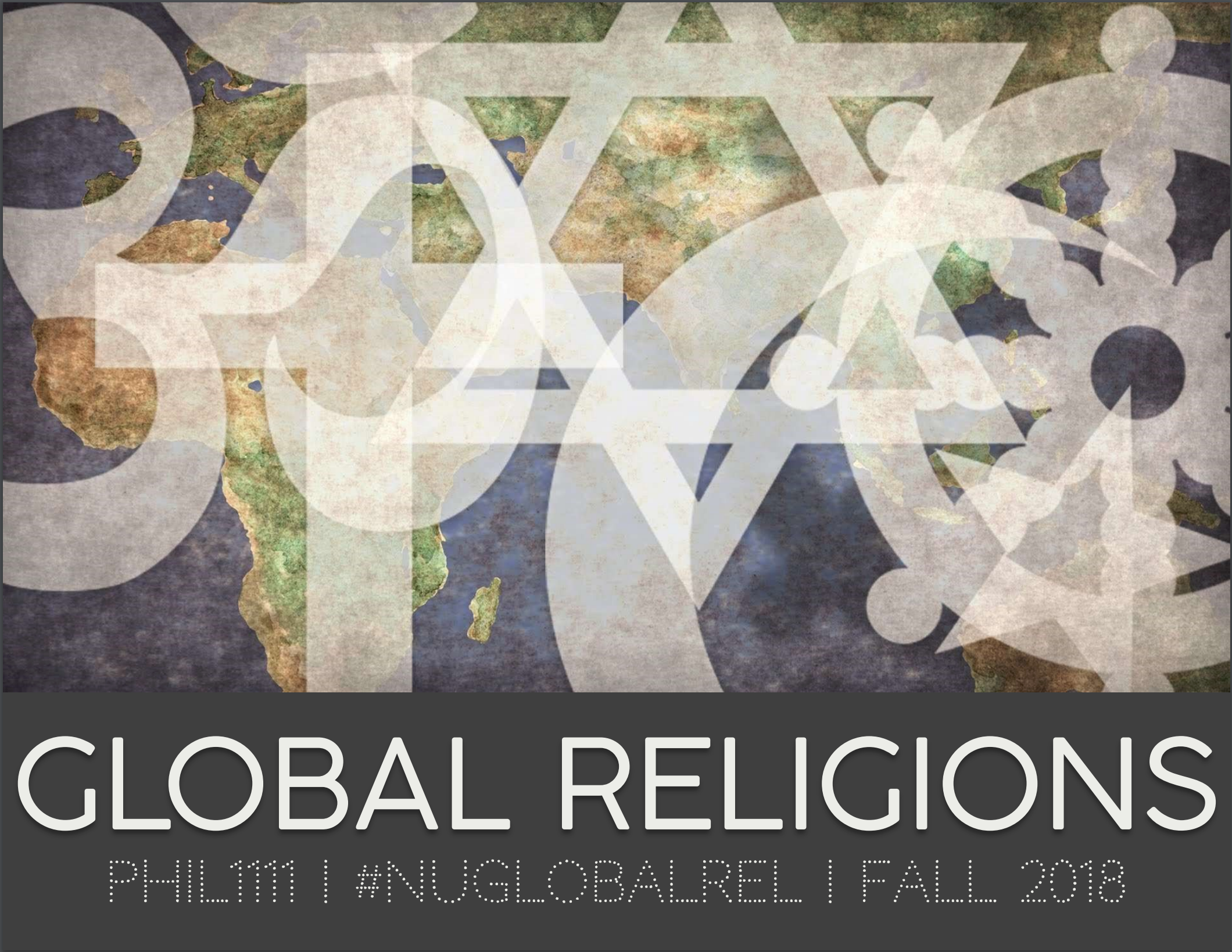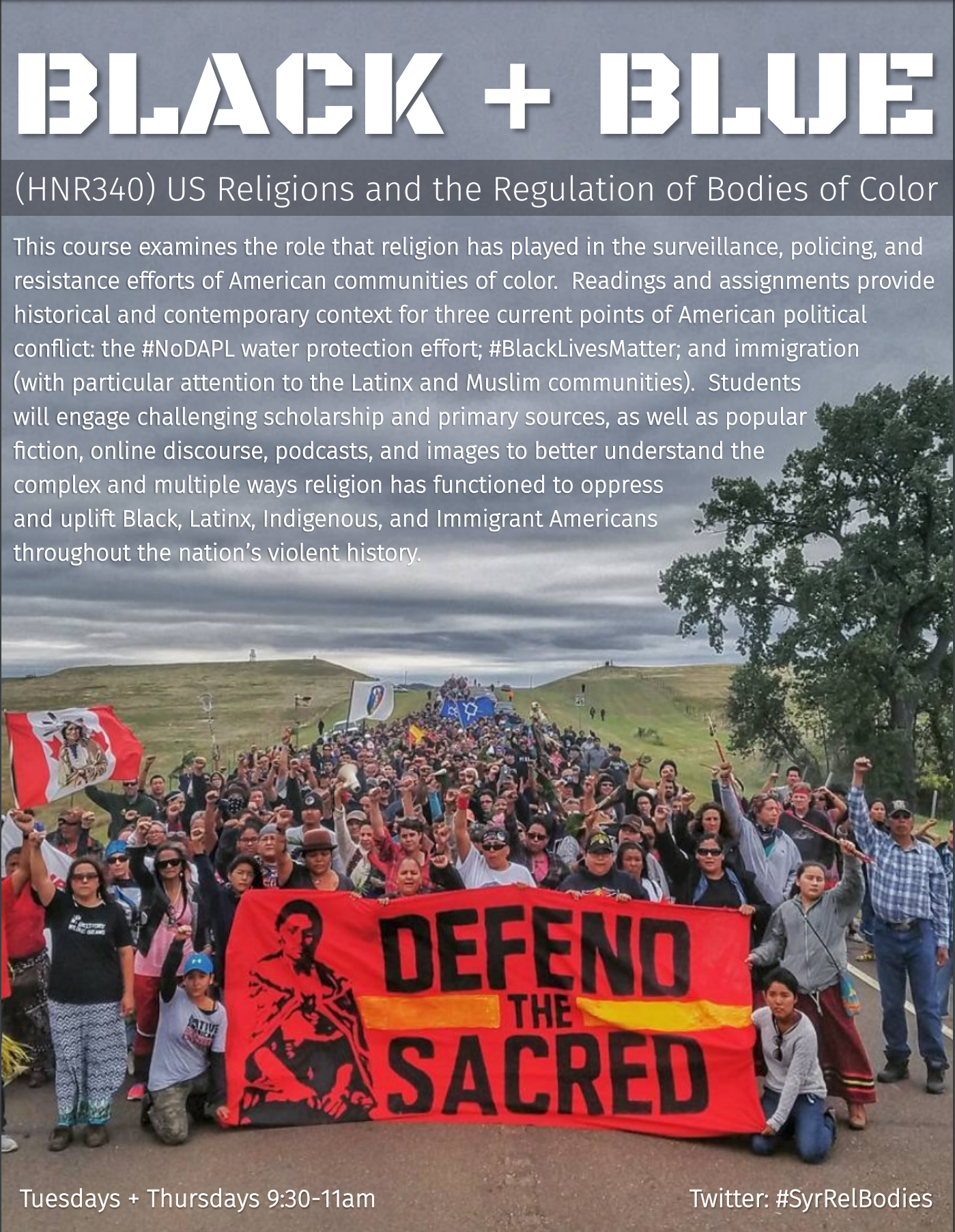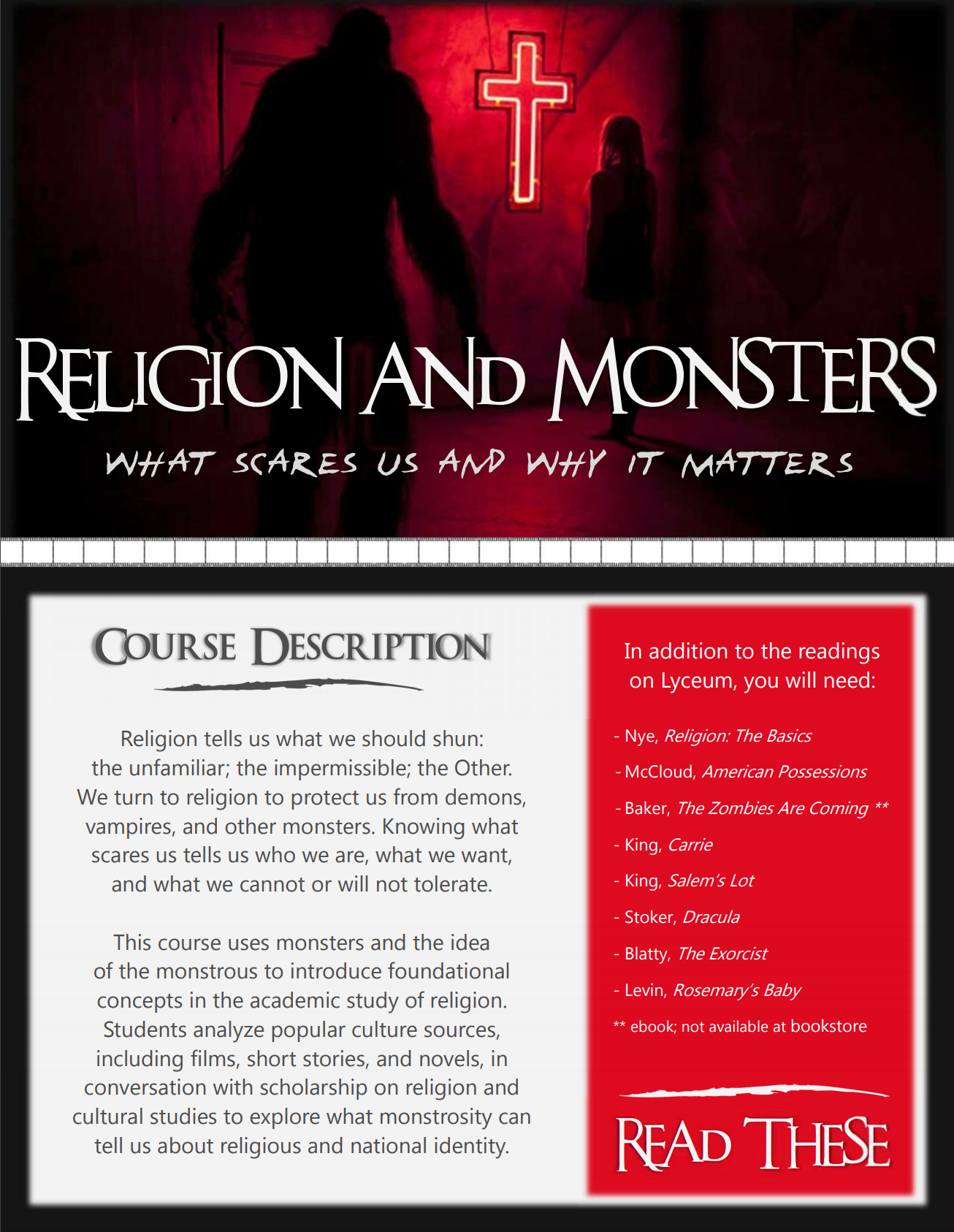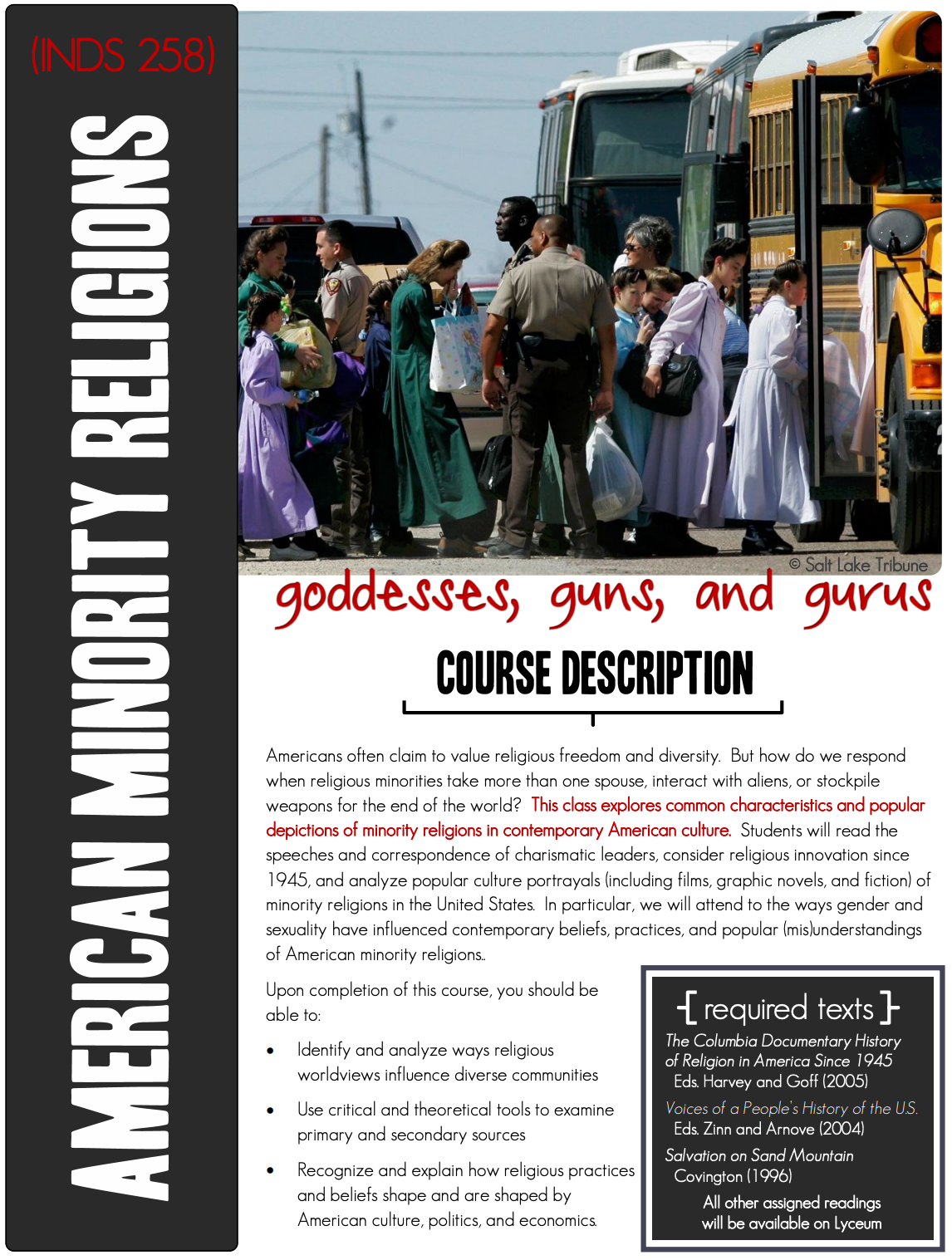teaching
From 2014-2016, I was an Andrew W. Mellon Foundation postdoctoral fellow in
creative & innovative pedagogy in the Humanities at Bates College.
My course, “They’re Coming to Get You, Barbara! Religion and the Monstrous Feminine”
was #36 on Elle’s list of “College Classes that Give Us Hope for the Next Generation.”
My pedagogy has also been featured in Women in Higher Education and Sowing the Seed.
Keep scrolling to check out my classes.
Meaning/s of Death
(Phil1220) Northeastern University
Introductory Course
The meaning(s) we make of death reveal important things about ourselves, our communities, our commitments, our desires, and our limits. This class explores death and what we make of it as a window into the study of religion. Students engage fiction, films, podcasts, and scholarly analyses to learn how and why religious studies helps us make meaning of human experiences (and what comes after them).
Witches: Gender & American Religion(s)
(PHIL1104) Northeastern University
Introductory Course Adapted for Remote Learning
Religion tells us what we should shun: the unfamiliar; the impermissible; the Other. We turn to religion to protect us from demons and monsters. Knowing what scares us tells us who we are, what we want, and what we cannot or will not tolerate. What, then, can we learn from the Witch? This course uses witches and the idea of the monstrous feminine to introduce foundational concepts in the academic study of religion and gender. Students analyze popular culture sources (including films, poems, and short stories) in conversation with scholarship on religion and cultural studies to explore what the Witch can tell us about gender and religion(s) in what is now the United States.
Cults & Sects
(PHIL4390) Northeastern University
Capstone Course Adapted for Remote Learning
"Cult" is a word that gets used a lot, but what exactly IS a cult? Most often, cult describes beliefs we don't like or that make us uncomfortable, practices we think are stupid or exploitative, and groups we worry are dangerous. But is religion dangerous? Or do we use religion in dangerous ways? This class considers some ways "cult" gets used (by popular media, law enforcement, journalists, and even scholars) to criticize, discourage, and punish minoritized groups who do religion too differently – especially when those groups use religion to challenge white supremacy in what is now the United States.
Global Religions
(PHIL 1111) Northeastern University
Introductory Course Adapted for Remote Learning
What is religion and why does it matter? This course will introduce you to the academic study of religion — scholarly engagement with practices, communities, texts, beliefs, and commitments. We will focus on three course commitments: understanding religion’s multiple meanings, exploring how people live their religions, and analyzing how creativity and conflict help us better understand this phenomenon.
Witches: Women in Western Religion
(PHIL 1104) Northeastern University
Introductory Course
This course uses witches and the idea of the monstrous feminine to introduce foundational concepts in the academic study of religion and gender. Students analyze popular culture sources-including films and short stories-in conversation with scholarship on religion and cultural studies to explore what the Witch can tell us about women and western religion(s).
Religion & Sexuality
(PHIL 1271) Northeastern University
Intermediate Course
The relationship between religion and sexuality is complex, seemingly contradictory, often tense, and full of possibility. This class will consider the richness of sexual difference in the context of contemporary global religions, especially at it relates to Islam, Judaism, and Christianity. Discussion topics include contraception, polygyny, abuse, homonationalism, and religiously motivated fear—even hatred—of queerness and queer people.
Global Religions
(PHIL 1111) Northeastern University
Introductory Course
What is religion and why does it matter? This course will introduce you to the academic study of religion — scholarly engagement with practices, communities, texts, beliefs, and commitments. We will focus on three course commitments: understanding religion’s multiple meanings, exploring how people live their religions, and analyzing how creativity and conflict help us better understand this phenomenon.
How to Do Things with Words: Philosophy of Literature
(PHI 215) University of Southern Maine
Introductory Course
How does philosophy and critical theory help us understand literature? What does literature do? This course considers the performative function of literature and language: how we do things with words, and why what we do with words matters. Students engage theoretical approaches to language and literature alongside short stories, poems, and excerpts from novels to better understand the role literature plays in articulating, shaping, and resisting cultural norms.
Black + Blue: American Religions
and the Regulation of Bodies of Color
(HNR 340) Syracuse University
Advanced Honors Seminar
This course examines the role that religion has played in the surveillance, policing, and resistance efforts of American communities of color. Readings and assignments provide historical and contemporary context for three current points of American political conflict: the #NoDAPL water protection effort; #BlackLivesMatter; and immigration (with particular attention to the Latinx and Muslim communities). Students will engage challenging scholarship and primary sources, as well as popular fiction, online discourse, podcasts, and images to better understand the complex and multiple ways religion has functioned to oppress and uplift Black, Latinx, Indigenous, and Immigrant Americans throughout the nation’s violent history.
American Minority Religions: Goddesses, Guns, and Gurus
(REL 200) Syracuse University
Intermediate Course
Americans often claim to value religious freedom and diversity. But how do we respond when religious minorities take more than one spouse, interact with aliens, or stockpile weapons for the end of the world?This class explores common characteristics and populardepictions of minority religions in contemporary American culture. Students will read the speeches and correspondence of charismatic leaders, consider American religious innovation since the 1920s, and analyze popular culture portrayals (including films, graphic novels, and fiction) of minority religions in the United States. In particular, we will attend to the ways gender, sexuality, race, and class influence practices, beliefs, and popular (mis)understandings of American minority religions.
Election! Race, Religion, and American Politics
(REL 200) Syracuse University
Intermediate Honors Seminar
America is a nation that prides itself on religious diversity but has been deeply shaped by Christianity. In light of the 2016 presidential election, understanding these tensions is crucial. This course examines religious and political issues that will shape the 2016 election while grounding contemporary debates in their historical context, paying particular attention to the religio-political valence of race. Students analyze speeches, debates, court cases, and visual and popular culture sources as well as scholarly articles to explore how religion and politics shape and are shaped by each other.
What’s God Got to Do with It?
Introduction to the Study of Religion
(REL 120) Syracuse University
Introductory Course
This course will introduce you to the academic study of religion — scholarly engagement with practices, communities, texts, beliefs, and commitments. We will focus on three course commitments: understanding religion’s multiple meanings, exploring how people live their religions, and analyzing how creativity and conflict help us better understand this phenomenon.
They’re Coming to Get You, Barbara!
Religion and the Monstrous Feminine
(REWS) Bates College
Intermediate Course
Religion tells us what we should shun: the unfamiliar; the impermissible; the Other. We turn to religion to protect us from demons, vampires, and other monsters. Knowing what scares us tells us who we are, what we want, and what we cannot or will not tolerate. How, then, do we make sense of the monstrous feminine?
This course uses monsters and the idea of the monstrous to introduce foundational concepts in the academic study of religion and gender. Students analyze popular culture sources, including films, short stories, and novels, in conversation with scholarship on religion and cultural studies to explore what monstrosity can tell us about religion and embodiment.
(#36 in Elle’s “63 College Classes that Give Us Hope for the Next Generation”)
Election! Religion and American Politics
(ACRE 214) Bates College
Intermediate Course
America is a nation that prides itself on religious diversity but has been deeply shaped by Christianity. Americans claim to support a separation of church and state but also call the United States a Christian nation. In light of the 2016 presidential election, understanding these tensions is crucial.
This course examines religious and political issues that will shape the 2016 election while grounding contemporary debates in their historical context. Students analyze speeches, debates, court cases, and visual and popular culture sources as well as scholarly articles to explore how religion and politics shape each other.
Religion and Monsters: What Scares Us and Why It Matters
(ACRE S29) Bates College
Introductory Course
Religion tells us what we should shun: the unfamiliar; the impermissible; the Other. We turn to religion to protect us from demons, vampires, and other monsters. Knowing what scares us tells us who we are, what we want, and what we cannot or will not tolerate.
This course uses monsters and the idea of the monstrous to introduce foundational concepts in the academic study of religion. Students analyze popular culture sources, including films, short stories, and novels, in conversation with scholarship on religion and cultural studies to explore what monstrosity can tell us about religious and national identity.
Religion and Sexuality
(REL 211) Bates College
Intermediate Course
The relationship between religion and sexuality is complex, seemingly contradictory, often tense, and full of possibility. This class will consider the richness of sexual difference in the context of contemporary global religions. Discussion topics include consent, religious ecstasy, plural marriage, contraception, and religiously motivated fear—even hatred—of queerness and queer people.
American Minority Religions:
Goddesses, Guns, and Gurus
(INDS 258) Bates College
Intermediate Course
Americans often claim to value religious freedom and diversity. But how do we respond when religious minorities take more than one spouse, interact with aliens, or stockpile weapons for the end of the world? This class explores common characteristics and popular depictions of minority religions in contemporary American culture. Students will read the speeches and correspondence of charismatic leaders, consider religious innovation since 1945, and analyze popular culture portrayals (including films, graphic novels, and fiction) of minority religions in the United States. In particular, we will attend to the ways gender and sexuality have influenced contemporary beliefs, practices, and popular (mis)understandings of American minority religions.

















